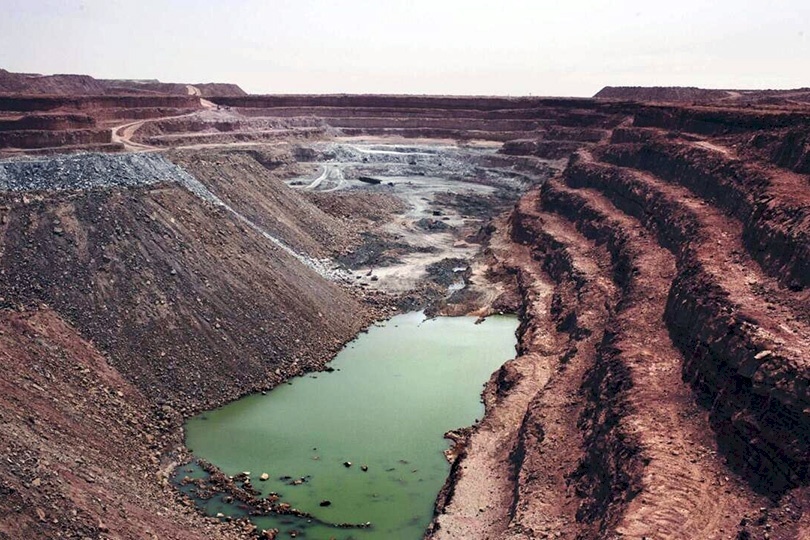
The Struggle for Niger's Independence from France's Control over Uranium
SadaNews - Twenty years ago, former Niger President Colonel Mamadou Tandja (1999-2010) entered into negotiations with the French company Areva, which later became the Orano Group, aiming to end Paris's monopoly on his country's wealth and gain economic independence.
Two decades after those negotiations, which did not achieve their goals, General Abdourahamane Tiani came to power through a swift coup in July 2023, implementing what Colonel Tandja had dreamed of and going further by severing ties with Paris and expelling its troops from the entire country.
With its diverse economic resources and its vast strategic location in the heart of the Sahara and Sahel region of West Africa, Niger has historically attracted the interest of economic actors from around the world, holding 5% of the global uranium market and possessing the sixth-largest reserves of it in the world.
In addition to uranium, Niger has immense wealth in oil and gold, and it is among the leading African countries rich in livestock.
However, for the past six decades, it has failed to escape the plight of countries dependent on humanitarian aid, receiving 40% of its budget from international partners and donors.
According to World Bank data, approximately 44.5% of Niger's population lives in extreme poverty, meaning that its wealth is squandered between internal corruption and external exploitation.
Signs of Separation
In 2005, Tandja opened a dialogue with the French group operating in the country through two subsidiaries, SOMAIR and COMINAK, promoting the slogan "Uranium should benefit the people of Niger," thus establishing a new direction toward economic sovereignty.
The French group had monopolized uranium extraction in Niger due to contracts established in 1960, under which Niamey received only 10% of the total extracted from the country.
Its annual production reached about 3,300 tons, representing 10% of global production and approximately 30% of Paris's electricity needs.
After three years of back-and-forth between Tandja's government and the French group, both parties reached an agreement in January 2008, which increased the purchase price of uranium by 50%.
Under this agreement, Areva obtained rights for 40 years at the giant "Imouraren" mine, with expected production of 5,000 tons per year for an investment of 1.2 billion euros, and the company "Imouraren" was established as a joint venture, where Niger held 33.35% through its state company and Areva retained the remainder.
According to a former official of the French group, Tandja's efforts and his attack on French interests sent a strong message that Niamey could take control of its affairs, and the reforms he implemented added a new dimension to partnerships with external parties.
The agreement came after the country enacted a mining law in 2006 that considered the country's interests and canceled many privileges that external parties considered to be part of flexibility with partners.
Thus, the 2006 law eliminated automatic tax exemptions, imposed escalating fees of up to 12%, and granted the state a free 10% stake in all projects, with an option to increase it to 30%.
Nationalization and the End
Despite the bold efforts and reforms made by Tandja, they did not succeed in achieving economic sovereignty and removing French companies, as the stability conditions contributed to freezing financial terms for periods extending up to two decades, restraining the state and leaving the sector exposed.
After two decades since the start of former President Mamadou Tandja's reforms, uranium returned to be at the heart of the political struggle between Niamey and Paris.
In July 2023, General Abdourahamane Tiani seized power amidst heightened tensions between the leaders of the Sahel Alliance (Niger, Mali, Burkina Faso) and Paris, the former colonizer of the region.
General Tiani, like other leaders of the Sahel Alliance, raised the banner of economic sovereignty as part of political independence, announcing his opposition to foreign presence in the region, considering France responsible for the woes of the peoples in the African Sahel, accusing it of financing terrorism and destabilizing the region.
In the context of economic sovereignty, after disagreements with the Orano company, which resorted to filing a lawsuit before the ongoing dispute center of the World Bank in Washington, the authorities in Niamey decided to withdraw the license from the "Imouraren" mine, which had never entered production.
One year after the mine's license was revoked, on June 19, 2025, the authorities announced the nationalization of the "SOMAIR" company.
Thus, more than half a century of Orano's presence in Niger came to an end, and the dream of economic sovereignty and separation from Paris in managing uranium resources was realized.
Source: African Agencies + Reuters

Trump: If Nouri al-Maliki Returns as Prime Minister, We Will Not Provide Aid to Iraq

A Dead Man and Injured Due to the SDF Shelling in Hasakah Countryside and Displacement due...

Reports: Death Toll from Protests in Iran May Exceed 10,000

UN Organization: Displacement of 400 Families in Yemen Within 3 Weeks

U.S. Official: We Identify ISIS Prisoners to Transfer the Most Dangerous Ones

Storm "Vern": 21 Dead in America and Power Outages Affecting Over 800,000 Homes

Confirming Continued Support for Palestine.. Saudi Foreign Minister: Our Relations with th...

